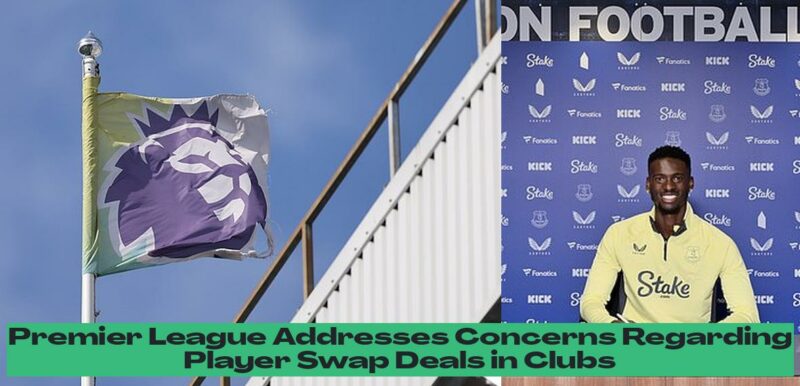Why the Premier League is Concerned About Swap Deals
Oh, swap deals – the sneaky siblings of the football transfer world. It seems like the Premier League had to put its foot down on these shenanigans! Imagine if they were literal swappers, clubs casually trading players like kids swapping Pokémon cards. But alas, it’s a little more complex than that.
So, why is the Premier League all hot and bothered about these swap deals? Well, it seems like some clubs were getting a bit too friendly with each other in the transfer market. Picture this: two clubs exchange players at what might seem like a bargain deal but could actually be an attempt to bypass financial rules. Sneaky, right?
Unwrapping the Concerns: The Premier League had to send stern letters to its clubs because they were playing fast and loose with the Profit & Sustainability Rules. These rules limit how much money clubs can lose before going into the red zone—kind of like putting boundaries on your favorite shopaholic friend.
BFN Fact: Did you know that there’s a possibility of returning part of a transfer fee if it’s deemed inflated? Yep, it’s almost like asking for a refund on that overpriced t-shirt you bought last summer.
Now, let’s dive into why these swap deals have caused such a stir in Premier League boardrooms:
- Inflated Valuations: The league was worried that some clubs were inflating player transfer fees to boost their financial standings before an accounting deadline hit. It’s like trying to fluff up your bank balance by suddenly valuing your grandma’s antique tea set as priceless.
- Amortisation Shenanigans: When a club sells a player, they get instant profit in their accounts while the buying club spreads out the payment over time (amortisation). This difference in accounting treatment could be exploited in swap deals to make things look rosier than they actually are financially.
- Fair Market Value Drama: The league wasn’t having any of this funny business and warned clubs against receiving fees higher than fair market value for players not traded at arm’s length (aka without any shifty business behind closed doors).
Spotlight on Homegrown Talent: Academy products were at center stage in these swap deals between Everton and Villa, with names like Tim Iroegbunam and Lewis Dobbin making headlines for all the wrong reasons – well, at least as far as financial rulebooks are concerned!
Have you ever thought about what would happen if Monopoly money was involved in real-life transfers? Well, now you’ve got an idea! Keep reading for more insight into why these ‘swap deal’ concerns are causing ripples through the Premier League waters…
Understanding the Profit & Sustainability Rules (PSR) in the Premier League
Understanding the Profit & Sustainability Rules (PSR) in the Premier League:
- The Profit and Sustainability Regulations in the Premier League are like financial guardrails for clubs, ensuring they don’t go off a fiscal cliff. Picture this: clubs can’t go on a spending spree to Pluto without a return ticket!
- So, what’s the magic number under these rules? Drumroll please… Clubs are allowed to lose up to £105 million over a cozy three-year time frame. If you’re thinking about your own bank balance right now, wouldn’t it be something if we could have such lofty limits in our personal budgets?
- But hold on— this isn’t a free-for-all money-losing bonanza! The PSR isn’t just about counting losses; it also permits deductions like investments in infrastructure, academies, charity work (kudos!), and even goals for women’s football empowerment.
Imagine these rules as referees keeping tabs on the financial match-ups within the league. They make sure clubs don’t score own goals financially or play dirty with loopholes that could lead to unfair advantages.
Now, let’s unravel some common misconceptions around PSR and how it differs from Financial Fair Play (FFP):
- In the past, you might have heard FFP being thrown around like confetti at a victory parade. But now, we’re all about that new name game! The Premier League has rebranded these regulations as PSR, but it’s like when your favorite artist changes their stage name—the music is still just as good!
- While FFP and PSR sound snazzy and official, their mission remains crystal clear: keeping an eagle eye on club finances to prevent them from spiraling into debt chaos faster than you can say “transfer deadline day.”
The next time you see clubs engaging in swap deals left, right, and center, remember that while swaps may sound like fun party games between clubs, they should steer clear of using them as sneaky shortcuts around the PSR rules. It’s all fun and games until someone breaches financial regulations—then it becomes a red card situation! So keep your eyes peeled for fair play both on and off the pitch!
- The Premier League is concerned about swap deals between clubs potentially being used to bypass financial rules.
- Clubs exchanging players at seemingly bargain deals could actually be inflating player transfer fees to boost financial standings.
- The league sent stern letters to clubs due to concerns about Profit & Sustainability Rules violations.
- There’s a possibility of returning part of a transfer fee if it’s deemed inflated, similar to asking for a refund on an overpriced item.
- Amortisation differences in accounting treatment between selling and buying clubs could be exploited in swap deals.
- The Premier League warned against receiving fees higher than fair market value for players not traded at arm’s length.
- The spotlight is on homegrown talent as academy products were highlighted in the concerns raised by the Premier League.









